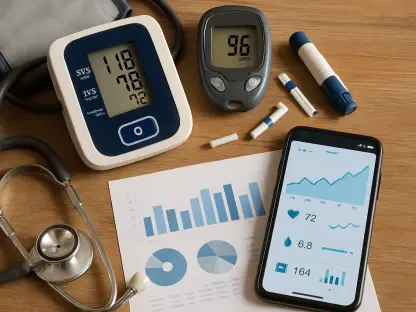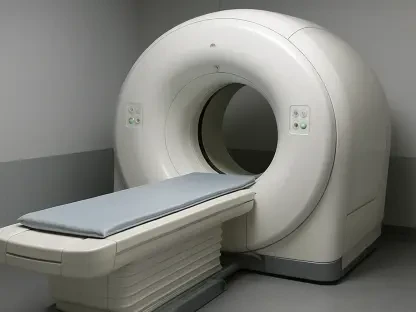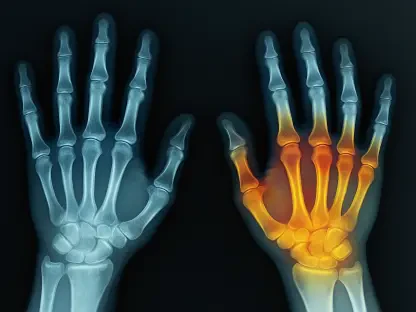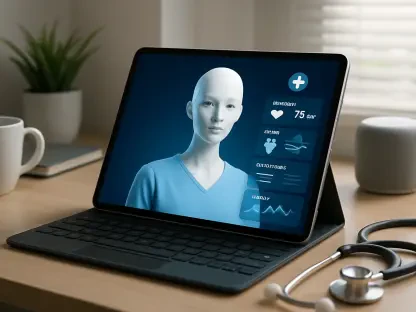As the healthcare industry continues to evolve, the integration of artificial intelligence (AI) into medical systems stands at the forefront of innovation. One of the most significant areas where AI is making an impact is in patient care through virtual health assistants (VHAs). These AI-driven tools have not only transformed remote patient monitoring but have also shifted the focus of healthcare from a reactive to a more proactive and preventive approach. This remarkable transformation is shaping the future of medical services, offering continuous, personalized support that empowers patients and streamlines clinical operations.
Transforming Healthcare with AI Integration
Continuous Real-Time Monitoring
The use of AI-powered VHAs in continuous real-time monitoring has changed the landscape of healthcare by enabling clinicians to track patients’ health status around the clock. This continuous observation allows for early detection of potential health issues, providing a means for timely intervention before problems escalate. As a result, healthcare providers can better manage chronic conditions and ensure patients maintain stability without the need for frequent hospital visits, boosting both convenience and health outcomes. For example, these systems can monitor vital signs, manage medication schedules, and provide reminders for lifestyle modifications, such as exercise or dietary changes, enhancing overall patient compliance and engagement.
Additionally, AI integration into healthcare systems ensures data-driven decisions, promoting accuracy and efficacy in patient care. Virtual health assistants gather and analyze patient data, offering predictive insights that help clinicians make informed choices tailored to individual patient needs. By transforming raw data into actionable intelligence, VHAs significantly contribute to improved health outcomes and patient satisfaction. This proactive approach leads to a reduction in hospital readmissions and alleviates the burden on healthcare facilities, highlighting the immense potential of AI in reshaping the traditional healthcare landscape.
Shifting to a Proactive Care Model
The adoption of AI technologies in virtual health assistants is steering the medical field towards a proactive care model, emphasizing prevention and early intervention. By focusing on detecting issues before they become serious problems, healthcare providers can offer timely solutions, minimizing complications and improving recovery times. This proactive model marks a departure from the conventional reactive approach, where treatment typically occurs after the onset of symptoms, often leading to prolonged recovery and additional healthcare costs.
Moreover, AI-powered VHAs enable personalized treatment plans, considering each patient’s unique medical history and lifestyle. These systems use machine learning algorithms to identify patterns and potential risks, allowing for tailored recommendations that align with individual health goals. Such personalization fosters patient engagement, helping individuals take an active role in managing their health and adhering to prescribed regimens. This shift towards proactive care not only enhances patient outcomes but also represents a cost-effective strategy for healthcare providers, as it reduces unnecessary hospital visits and the associated expenses.
Virtual Health Assistants in Practice
Growth in Market Demand
The increasing demand for virtual health assistants is reflective of the growing need for accessible, continuous healthcare services. In recent years, the market for intelligent virtual assistants has expanded significantly, driven by advancements in AI technologies and the pressing demand for remote health management solutions. By offering automated services and virtual consultations, these AI-driven tools meet the rising expectations for efficiency and responsiveness in healthcare delivery, serving as a testament to their transformative impact.
In the United States, the market for health-focused intelligent virtual assistants is projected to reach substantial figures by 2030, indicating widespread adoption and trust in these systems. This growth mirrors the broader trend towards digital health innovations, as both patients and healthcare providers recognize the benefits of AI integration in facilitating a seamless, continuous care experience. It is anticipated that as AI technology advances further, virtual health assistants will become even more sophisticated, offering expanded services that cater to a broader range of medical conditions and challenges.
Practical Applications and Success Stories
The practical applications of AI-powered virtual health assistants demonstrate their efficacy in real-world healthcare settings. From managing chronic diseases such as diabetes and hypertension to providing mental health support, these systems have proven to be versatile tools in addressing diverse medical needs. For instance, VHAs can assist in tracking glucose levels, providing reminders for medication intake, and offering lifestyle recommendations tailored to individual patient needs.
Various healthcare institutions have reported positive outcomes from integrating virtual health assistants into their care models. Patients benefit from enhanced engagement and empowerment, making informed health decisions and adhering more effectively to treatment plans. Clinicians, on the other hand, gain valuable support in managing workloads and making data-informed clinical decisions. By enhancing patient-provider communication and ensuring accurate, real-time data analysis, VHAs contribute to improved health outcomes and patient satisfaction, emphasizing their role as indispensable assets in modern healthcare practice.
Economic and Clinical Benefits
Cost Efficiency and Resource Allocation
The implementation of AI-powered virtual health assistants offers notable economic advantages by reducing healthcare costs and optimizing resource allocation. By enabling remote monitoring and early detection of health issues, VHAs effectively minimize unnecessary hospital visits and associated expenses. This efficient approach helps to streamline healthcare operations, allowing providers to allocate resources more strategically and focus on delivering quality care to those with urgent needs.
Moreover, the cost-efficiency of virtual health assistants extends beyond reducing hospitalization rates. They enhance operational productivity by automating routine tasks such as data entry, appointment scheduling, and patient follow-ups. This automation not only reduces administrative burdens on healthcare staff but also allows clinicians to concentrate on providing direct patient care, ultimately leading to improved overall service delivery.
Enhancing Clinical Decision-Making
AI’s role in enhancing clinical decision-making is integral to the success of virtual health assistants. By analyzing vast datasets with precision and speed, AI systems help clinicians gain deeper insights into patient health, leading to more accurate diagnoses and personalized treatment plans. The predictive capabilities of AI allow healthcare providers to anticipate potential health risks and intervene early, thereby improving patient outcomes and reducing the likelihood of complications.
Virtual health assistants also play a crucial role in supporting continuous patient engagement. By communicating regularly with patients through user-friendly platforms, VHAs ensure consistent adherence to treatment plans, reinforcing positive health behaviors. This constant interaction fosters a collaborative environment where patients feel supported and informed about their health journey. The combination of AI-driven insights and patient engagement significantly contributes to advancing both clinical and economic objectives in healthcare.
Future Directions and Considerations
Expanding Access to Healthcare Services
As AI technology evolves, virtual health assistants are poised to play an even more significant role in expanding access to healthcare services. By providing remote monitoring and telehealth solutions, VHAs offer a practical solution for individuals in underserved or rural areas, where access to healthcare facilities may be limited. This technological advancement ensures that more patients can receive high-quality care regardless of their geographical location, promoting health equity.
Additionally, virtual health assistants can support multilingual communication, breaking down language barriers that often impede access to healthcare. This feature is especially valuable in diverse communities, where language differences can hinder effective patient-provider interaction. Through real-time translation and culturally sensitive support, VHAs facilitate comprehensive healthcare access, empowering individuals to actively participate in managing their health.
Addressing Privacy and Ethical Concerns
Despite the numerous benefits offered by AI-powered virtual health assistants, there are important privacy and ethical considerations that must be addressed. The collection and analysis of sensitive medical data necessitate strict adherence to privacy regulations and standards to protect patient information. Establishing robust security measures is essential to prevent unauthorized access and ensure patient trust in the use of AI technologies.
Furthermore, ethical considerations surrounding the deployment of AI in healthcare revolve around transparency, accountability, and fairness. Ensuring that AI systems make unbiased, equitable decisions is crucial to maintaining trust and integrity in healthcare processes. Continuous evaluation and oversight of AI applications in healthcare are vital to addressing these challenges and ensuring that VHAs remain a beneficial tool for patients and providers alike.
The Path Forward for AI-Driven Healthcare Solutions
As the healthcare industry rapidly evolves, artificial intelligence (AI) is increasingly becoming a core component, particularly within medical systems. One of the most notable advancements is the incorporation of virtual health assistants (VHAs). These AI-powered tools are revolutionizing patient care, significantly impacting not only how care is delivered but also shifting the overall healthcare model from a reactive stance to one that is more proactive and preventative. This shift represents a remarkable transformation in how medical services are provided, as it allows for continuous, personalized patient engagement. VHAs enable healthcare providers to monitor patients remotely with unprecedented efficiency, thus streamlining clinical operations and enhancing the patient experience. By facilitating real-time communication and providing timely healthcare information, these systems empower patients to take a more active role in their health and wellness. As a result, VHAs are not only changing the way care is provided but are also enhancing the quality of life for patients, making healthcare more accessible, efficient, and responsive than ever before. This trend is indicative of how AI will continue to shape the future landscape of healthcare.









